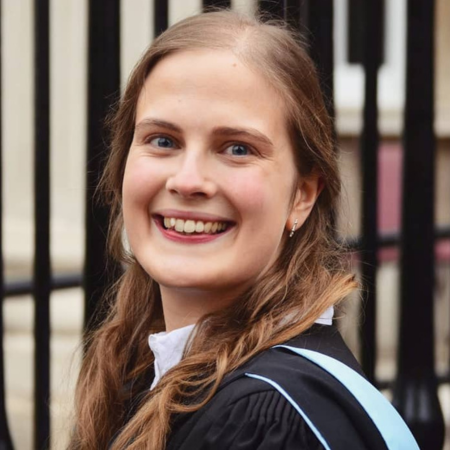
Meet the Expert PhD Special Edition – Lucy Robinson
Welcome to a special edition of 'Meet the Expert', our series bringing you informative interviews with Armed Forces researchers, policymakers and service providers. In this edition, we will be featuring a PhD Researcher as our expert. Read on to hear about their experiences during their PhD, the impact of their current work and their insights on key issues impacting ex-Service personnel and their families.
 In this issue, we interviewed Lucy Robinson, a fourth-year doctoral researcher in the Department of Education, University of Oxford, funded by an Economic and Social Research Council (ESRC) Grand Union Doctoral Training Programme (DTP) studentship. Her research engages in a meaningful and creative way with Service children to explore how military life shapes their experiences of education and sense of self. Alongside her doctoral work, Lucy is a Trustee for the Armed Forces Education Trust (AFET) – a grant-giving charity for Service children.
In this issue, we interviewed Lucy Robinson, a fourth-year doctoral researcher in the Department of Education, University of Oxford, funded by an Economic and Social Research Council (ESRC) Grand Union Doctoral Training Programme (DTP) studentship. Her research engages in a meaningful and creative way with Service children to explore how military life shapes their experiences of education and sense of self. Alongside her doctoral work, Lucy is a Trustee for the Armed Forces Education Trust (AFET) – a grant-giving charity for Service children.
1. Please tell us about your background and how you came to undertake a PhD relating to the Armed Forces Community?
Before starting my DPhil in Education at the University of Oxford, I completed my PGCE and MEd at the University of Cambridge. For my MEd dissertation, I looked at the relationship between the educational experiences of Service children and the Service Pupil Premium (SPP) by conducting case studies in two English state primary schools. This research focused on determining and analysing the perspectives of key stakeholders – parents, educational practitioners and the Service children themselves. Conducting the research made me appreciate how under-researched this field is and as such, I applied for an ESRC Grand Union DTP studentship, hosted by the Department of Education at the University of Oxford to continue researching within this area.
2. Can you describe your PhD project and how you feel this work fits into the bigger picture of understanding and supporting the Armed Forces Community?
My doctoral research focuses on how military life shapes Service children’s identity and school experiences. Whilst my MEd research looked at the perspectives of key stakeholders, my doctoral research focuses solely on the perspectives of the Service children themselves. As such, for my research, I had the pleasure of working with 19 Service children, aged between 9 and 16 years old, to explore their thoughts, feelings and experiences around their Service child identity and educational experiences. I am now at the stage of writing up my findings and the implications of my research.
The Armed Forces Community is a diverse group and I hope, by shining a light on Service children and their inherent diversity, a greater awareness and understanding can be reached of this sub-group.
3. Can you tell us about the research methods you are using in your PhD project? Are there any that you are particularly drawn to and enjoy using, and if so, why?
I am passionate about creative methods and how they can be used across the life course of a research project. For my research design, I chose to use a range of creative data generation methods – self-portraits and relational maps, timelines and free responses. By doing so, I offered my participants choice in the way they could explore and respond to my open-ended questions around their identity as Service children and their educational experiences. As a result, my dataset included group discussions, 1-2-1 discussions, written prose, poetry and drawings.
An overview of one of my data generation methods – the self-portrait and relational map – including a step-by-step guide has recently been published by the National Centre for Research Methods (NCRM) and can be read here.
4. What are your future aspirations following your PhD and any hopes for the impact your research may make?
My research both widens and nuances current understanding of Service children’s school experiences and furthers knowledge into how Service children see themselves. In so doing, it seeks to support the development of the professional body of knowledge and understanding in English state schools of Service children; to help inform SPP funding choices and wider school culture and practice. I am hoping to make my research impactful by ensuring it reaches a range of audiences that I want to engage with. As such, my research publication plan includes differing research outputs, including one designed specifically for Service children.
After my PhD, I hope to continue research which involves Service children, either in an applied way or through a more traditional academic role.
5. What other areas of research or policy relating to the Armed Forces Community are you especially passionate about? Please expand on this and tell us about them, as much as you can.
As a Service child myself and someone who has spent a great deal of time reflecting on my own lived experiences as part of my doctorate, I am very interested in research which focuses on the lived or living experiences of others who are part of the Armed Forces Community. I studied history as my first degree and as such, I am fascinated by social history, particularly ‘history from below’ which looks beyond the previous, prevailing narratives of the past.
Research which centres on the individual and is cognisant of the inherent complexity of life experiences is, in my opinion, incredibly rich and valuable. I believe it can effectively be used, alongside research from more of a quantitative methodological standpoint, to help shape policy and practice.
6. What do you think are the key challenges impacting current Veterans and their families, and how do you think research and/or policy can be best used to address them?
Although there is a growing research field involving Veterans, and with that increased awareness and understanding, this has yet to translate to children of Veterans. Very little is known about this sub-group of Service children and their experiences, despite it being a large group in terms of numbers. I therefore think there needs to be research conducted with these Service children, to explore how they experience the transition of their Serving parent or parents and whether/how this shapes their own identity. If challenges or areas of difficulty are identified, then Services and support can then be created to mitigate against these, as part of the broader programme of support on military transition.
7. What do you think will be the leading challenges for the next generation of Veterans and how do you think research and/or policy can be best used to address them?
I think the leading challenge is the constantly changing landscape for Veterans and their families. Changes to military life, alongside other domestic and wider geo-political events, are likely to affect future Service children’s experiences of growing up. As such, research and policy need to be cognisant of potential changes and engage in horizon scanning, so they can better respond to challenges that may arise.
8. Given unlimited funding and time, what would be your dream piece of research to undertake involving the Armed Forces community?
A fundamental issue within the research field of Service children is that there is a lack of data which captures the scale and characteristics of the cohort. Simply put, there is no accurate record of how many Service children there are, let alone any further pertinent detail. Therefore, given unlimited funding and time, my dream piece of research would start with amending this. This would open up so many research opportunities!
Many thanks to Lucy Robinson for sharing her insights.
Catch us next month for another interesting and informative interview with an expert from the Armed Forces Community.